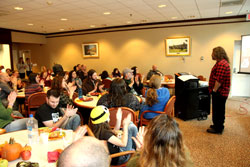The Monmouth Area Vegetarian Society (MAVS) hosted their first speaker and vegan potluck of the semester on Sunday, Feb. 16 in the Magill Commons Dining Club.
The event went from 1 pm until 3 pm with the first half hour dedicated to socializing and enjoying the vegan potluck. Over 40 people were in attendance.
“I’m really happy we can be part of a community where we all can share good, wholesome, real food,” Mary Harris, founder of MAVS, said.
The potluck featured all vegan foods arraying from blueberry brownies, curried cauliflower bisque, spaghetti squash, and chocolate pudding.
Attendees were asked to bring their own plates to decrease environmental impact.
Once everyone settled down, Harris introduced the speaker, Theresea Sarzynski, from the nonprofit organization For the Animals Sanctuary which is located in Blairstown, NJ.
Sarzynski began the seminar by explaining what the sanctuary does and how it began. “Debbie Kowalski originally bought the house with land with a previous partner, with the intention of being able to adopt a farm animal or two, when/if the need arose,” Sarzynski said. “Once they got their first two bovine, the calls started coming in, quickly. So the 501(c)3 came out of need. She knew she could take in more animals but needed help fundraising for all the extra costs of buildings, food, bedding, medical, etc.”
After this brief introduction, Sarzynski discussed each individual animal the nonprofit organization takes care of beginning with their very first resident, a Hereford steer named Herbie.
“In December of 2006, Herbie jumped off a slaughter truck in Brooklyn. If you google it, you’ll see videos of him running around and the police chasing him.”
Herbie’s species of cow is typically raised for meat and killed within the first year of their lives. When the sanctuary decided to open its doors to Herbie, they also decided Herbie should have a friend to be with. “Cows are very social creatures. They have best friends they pick who they hang out with,” Sarzynski said.
Due to this natural characteristic, the sanctuary took in a female named Kevina.
Both Herbie and Kevina reside at the sanctuary and have been for the past seven years.
Sarzynski then spoke of the other cows the For the Animals Sanctuary currently has and have had in the past.
Trying to hold back tears, Sarzynski began to speak of one cow in particular named Hope who passed away in February of 2012. “She lived through people taking her babies, getting in a rape rack, moving from stall to stall,” Sarzynski said. “Hope was in the rape rack every week for a year but could not get pregnant, so the farmers wanted to send her to the slaughter house.”
When Hope finally made it to the sanctuary, she did not allow the volunteers at the sanctuary to get near her for six months. It took her a year to be around visitors. According to Sarzynski, she felt she could not trust a human due to her past.
The sanctuary did not only want to rescue Hope from the farm, but another cow as well. “Amy was four weeks old when she came from the dairy farm,” Sarzynski said.
Amy was a twin to a male calf. When this occurs, both the male and female automatically go to slaughter because the female calf often becomes infertile which is useless to a dairy farmer. Sarzynski said that the farmer was willing to part with Amy because he would lose profit if she stayed in his place.
The final cows that Sarzynski mentioned during the lecture were a mother and her son who came to the sanctuary two years ago. “Having a mother see her son for two years of his life doesn’t happen anymore,” Sarzynski said.
Originally, the sanctuary was only going to get the son but the workers specifically asked if they could have the mom as well. The farmer agreed solely because he was transitioning from the dairy industry to the meat industry and it would be one less cow off his hands.
Sarzynski then talked about the pigs, goats, and chickens the sanctuary also looks after. “Typically, pigs go to slaughter at six months and chickens go to slaughter at six weeks. Chickens actually still have their baby chirps when they are sent to the slaughterhouse.”
Sarzynski closed her seminar by asking everyone to do their part by spreading the word and attempting to go vegan. “The moral baseline of any animal lover should be veganism. In addition to harming the animals directly, animal agriculture is killing the environment and the people eating them,” Sarzynski said.
As MAVS has concluded its first event of the semester, they have already begun to plan their second potluck. The event will be Sunday, March 30 in the Magill Commons Dining Club.
PHOTO TAKEN by Maggie Zelinka

